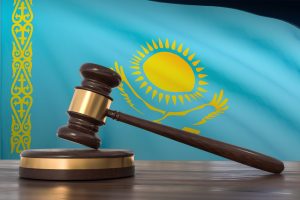A court in Konaev, Kazakhstan has sentenced journalist Duman Mukhammedkarim to seven years in prison on charges of financing an extremist group and participating in a banned group’s activities, stemming from an interview he conducted in December 2022 with Astana’s bête noire, fugitive banker and exiled government critic Mukhtar Ablyazov.
Mukhammedkarim’s trial began in February 2024, although he was arrested in the summer of 2023. The trial was delayed in late February after Mukhammedkarim complained he’d been mistreated in custody. An investigation was closed, with authorities citing a “lack of evidence.” The trial continued in May behind closed doors.
Mukhammedkarim’s YouTube channel, Ne Deydi (What Are They Saying?), which he created in 2015, has 147,000 subscribers at present. Notably, he reported on the January 2022 events and the aftermath in Almaty.
As KIBHR (Kazakhstan International Bureau for Human Rights and Rule of Law) laid out in a monitoring report published in July 2023, Mukhammedkarim was “especially known for openly criticizing the authorities on his airwaves” and participating in the March 2023 parliamentary elections after suing the territorial election commission, which had initially rejected his effort to register as an independent candidate. After the election, in which he was not awarded a seat, Mukhammedkarim said he would hold a peaceful protest. This effort yielded three administrative detentions of 25 days each. He’d previously been arrested for 15 days after calling the November 2022 presidential election illegal and again calling on people to protest.
KIBHR notes that in each of these cases, he was subject to administrative arrest – not a criminal offense – for violating the procedures for organizing peaceful assemblies. “A particularly important point is that, in fact, D. Mukhamedkarim did not have time to exercise his right to freedom of peaceful assembly, since he did not hold the rallies that he called for.”
In June 2023, he was charged under the criminal code – Articles 258 and 405, which pertain to financing terrorism or extremist activities and participating in the activities of a banned extremist organization – and put in pre-trial detention.
The charges stemmed from his December 22, 2022, interview with Ablyazov and the sharing of fundraising links for Ablyazov’s banned opposition movement, the Democratic Choice of Kazakhstan (DVK). DVK was declared an “extremist” movement in 2018 by Kazakh authorities. Association with the group, or Ablyazov, in any way tends to trigger a crackdown.
For example, in 2020, journalist and blogger Aigul Otepova was forcibly admitted to a psychiatric clinic ahead of her trial for “participating in an extremist organization” via alleged support for DVK and another banned political movement, the “Koshe” party. In 2021, she was sentenced to “restricted liberty” and banned from commenting on social or political issues for two years, according to a statement from the Clooney Foundation for Justice, which urged the overturning of her conviction:
In convicting Ms. Utepova, the Court concluded that the “similarity between the content of [her speech] and the ideas of the extremist organizations ‘DVK’ and ‘Koshe Party’” was sufficient to show her “participation” in an extremist group. It referred to expert findings that Ms. Utepova’s speech could create a negative attitude towards the authorities, lead to “anti-social” activities, and constituted distribution of “agitation and propaganda materials.”
Note the tenuous connection cited as sealing Utepova’s fate – a similarity of ideas was enough to prove participation.
When it comes to Mukhammedkarim’s case, more than three years later, the circus is much the same. According to the indictment, which Human Rights Watch viewed:
A state-commissioned psychological and philological expert analysis of Mukhammedkarim’s interview with Ablyazov claimed that some of Mukhammedkarim’s words in the video “promoted extremist ideas and views” and “showed signs of participation in the activities of the extremist DVK organization.” However, the analysis also concludes that the men talked about how “political change should be made peacefully” and that “the material presented for analysis does not contain appeals to organize a rally and seize power by force.”
In a January 2024 interview with the state-run Kazakh-language publication Egemen Qazaqstan, President Kassym-Jomart Tokayev said, “The main indicators of political persecution are censorship, tailor-made laws, and punitive authorities. Nothing like this exists in modern Kazakhstan. Our legislation does not contain a single decree, not a single law, no regulatory document that could be used to prosecute citizens for their political views.”
In the same interview, Tokayev proclaimed that “the old system is gone.” But Astana’s obsession with Ablyazov has bridged the Nazarbayev and Tokayev eras, undercutting efforts by the current president to present his regime as reformist in nature, and Kazakhstan as “new.”































